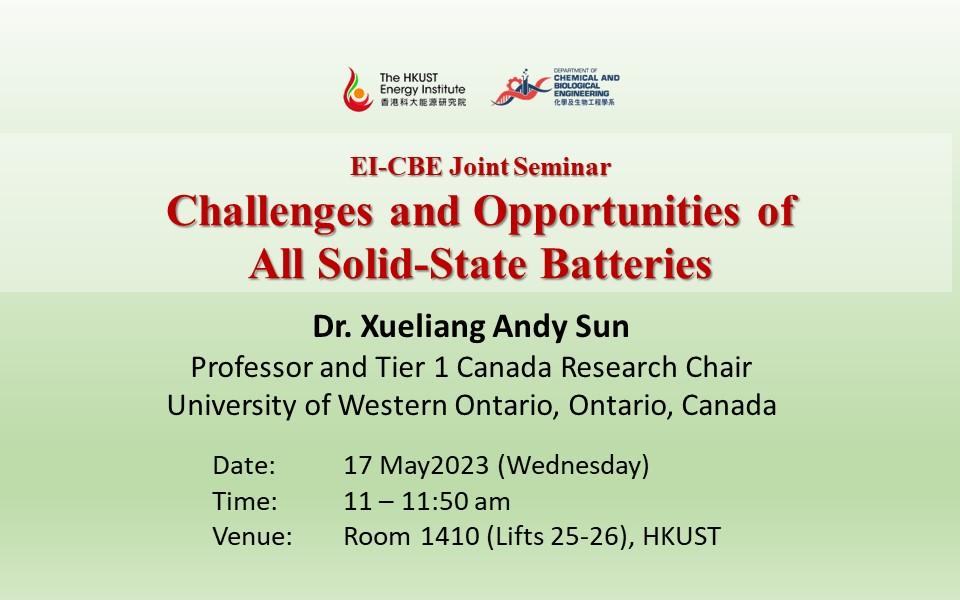Challenges and Opportunities of All Solid-State Batteries
Supporting the below United Nations Sustainable Development Goals:支持以下聯合國可持續發展目標:支持以下联合国可持续发展目标:
All-state-state lithium batteries (ASSLBs) have gained worldwide attention because of the high ionic conductivity of SEs, intrinsic safety and increased energy density. In ASSLBs, solid-state electrolyte is a key component and interface is a big challenge. In this talk, I will talk about two types of solid-state electrolytes including sulfide-based electrolyte (focusing on interface) and halide-based electrolytes (focusing on synthesis and increase of ionic conductivity).
In the first part of this talk, I will demonstrate to apply atomic layer deposition/molecular layer deposition (ALD/MLD) for interface design between sulfide-based electrolyte and cathode material. Compared with polymer-based and oxide-based electrolytes, sulfide-based electrolyte generally exhibits the highest ionic conductivity (10-3 ~ 10-2 S/cm) and favorable mechanical property. However, the serious interfacial challenge, bad air stability, narrow electrochemical windows of sulfide-based electrolyte significantly impede development of sulfide-based ASSLBs . Generally, an artificial, uniform and ultrathin interfacial layer is critical to address these challenges. ALD) and MLD are unique coating techniques that can realize excellent coverage and conformal deposition with precisely controllable at the nanoscale level due to its self-limiting nature, which are ideal for addressing the challenges of interface in SSLBs.
In the second part of this talk, I will talk about halide-based electrolyte for ASSLBs. Compared with sulfide-based electrolyte, both experimental and theoretical results recently demonstrate that halide-based electrolytes have more advantages including high RT ionic conductivity (>10-3 S cm-1, theoretically possible 10-2 S cm-1), wide electrochemically stable window (possible up to 6 V), high air-stability, good stability toward oxide cathode materials, and even salable water synthesis strategy.
Dr. Xueliang (Andy) Sun is a Distinguished University Professor and a Senior Canada Research Chair (Tier I) for the Development of Advanced Materials for Clean Energy, at the University of Western Ontario, Canada. Dr. Sun is a Foreign Member of the Chinese Academy of Engineering, a Fellow of Royal Society of Canada and Fellow of the Canadian Academy of Engineering. Dr. Sun received his Ph.D degree in Materials Chemistry at the University of Manchester, UK, in 1999.
Dr. Sun’s research is focused on advanced materials for energy conversion and storage including lithium batteries and fuel cells. Dr. Sun is an author of over 630 refereed-journals (e.g. Nature Energy, Nature Communications, Advanced Materials, J. Am. Chem. Soc., Angew. Chem., Nano Letter, Energy & Environmental Science) with citations of over 58,000 times and H-index of 124. He has given more than 180 plenary/keynote/invited talks in international conferences, symposia and workshops. Dr. Sun was named as one of "Highly Cited Researchers". He edited 4 books and published 20 book chapters as well as filed 56 patents. Dr. Sun is actively collaborating with industries such as Ballard Power Systems, General Motors, Lithium Phostech Inc., 3M, and China Automotive Battery Research Institute Co.. Dr. Sun received various awards such as Award for Research Excellence in Materials Chemistry Winner from Canada Chemistry Society and IBA Battery Technology Award. Dr. Sun is a Vice Chairman of the International Academy of Electrochemical Energy Science (IAOEES). He also serves as an Editor-in-Chief of “Electrochemical Energy Review” (IF=32) under Spring-Nature.
